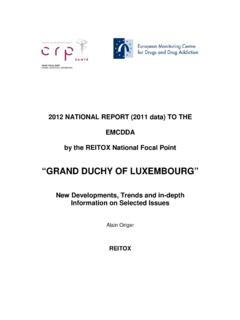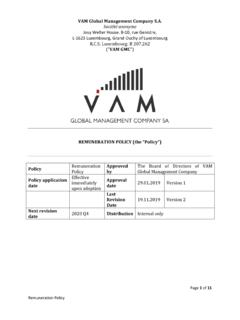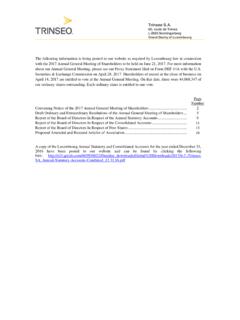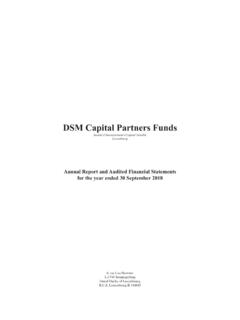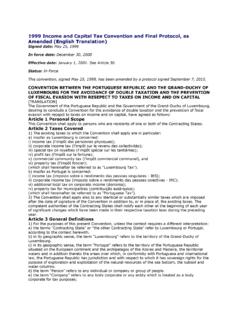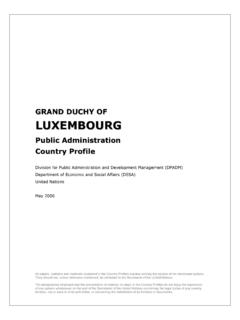Transcription of Human Dignity in the Grand Duchy of Luxembourg
1 Human Dignity in the Grand Duchy of Luxembourg by J rg Gerkrath and Maria Pichou* Luxembourg s current Constitution does not refer to Human Dignity but several Acts of Parliament are doing so in its place without providing any comprehensive definition. This lacuna is partially filled with Luxembourg s strong commitment to European and International law. Two of the main characteristics of Luxem-bourg s legal order: its attachment to monism and pragmatism, show up in this re-gard. The Grand Duchy is not only a contracting party to numerous international treaties that guarantee the respect for Human Dignity , its Representatives have al-ways strongly advocated the need to protect Human Dignity worldwide. Domestic authorities, when applying EU law need to grant the protection of Human Dignity as it is enshrined in the EU Charter of Fundamental Rights. It is up to the national judges to determine the content of Human Dignity on a case by case basis.
2 1 Introduction The Grand Duchy of Luxembourg , has not yet developed its own, home-grown idea of Human Dignity , dignit humaine or Menschenw rde . The cur-rent Constitution, which dates back to 1868 and partly even to 1848, does not even explicitly refer to Human Dignity either as a value, a principle, or as a specific fundamental right. Article 11 (1) merely mentions that the state guarantees the natural rights of the Human being and the family .1 Predictably the Constitutional Court had some trouble with decoding this rather enigmatic provision. Still, as it will be developed, many acts of Parliament retain the notion of Hu-man Dignity in various contexts and grant specific rights to Human beings in di-verse circumstances without ever defining precisely the notion s legal meaning. The resulting concept of Human Dignity , as retained for instance in the field of social assistance or with regard to over indebtedness, is thus more an ethical or a moral notion than a clear cut legal term allowing to infer direct legal implications.
3 The latter is only the case in the fields of palliative medicine, euthanasia and bio- * J rg Gerkrath is Professor in European and Public Law and Maria Pichou is Postdoctoral Researcher on Fundamental Rights and Public International Law at the University of Luxembourg . 1 L Etat garantit les droits naturels de la personne humaine et de la famille. In Luxembourg the official legal language is French. All translations of legal sources or secondary literature from French to English have been realised by the authors. 2 medicine where the link to the very nature of Human beings, their corporeality, corporal Dignity , life and death is particularly close. But even in these fields the legislator did not really define the concept of Human Dignity leaving it to the judges to determine its final shape on a case by case basis.
4 As a matter of fact, all the domestic political and legal actors seem to rely on the meaning given to Human Dignity under international law. Thus, the concept is mostly used in a sense based on its recognition under the 1950 European Conven-tion on Human Rights (ECHR) or the 1948 Universal Declaration of Human Rights (UDHR). Surprisingly, while Luxembourg s lawyers didn t seem to spend much effort on developing and understanding the meaning of Human Dignity in the domestic context, the State s Representatives abroad, however, participated very actively in European and international efforts to promote this notion and strengthen its legal protection. We will expand the current setting in Luxembourg more in detail by showing how the concept has been progressively incorporated into the domestic system (2), whereas it still lacks a coherent definition (3), and by assessing how it could be ensured more efficiently (4).
5 2 Incorporating Human Dignity in the domestic legal order Luxembourg s legal order displays some specificities that need to be mentioned. It can indeed be easily described as, first, being resolutely monist and, second, show-ing a profound pragmatism in receiving for instance legal transplants inspired by neighbouring countries or solutions enshrined by international treaties. With re-gard to the notion of Human Dignity both, monism and pragmatism, have played their role. Although Human Dignity is not constitutionally guaranteed for the mo-ment, the Grand Duchy has made many efforts to introduce this concept into its legal order notably under the influence of international law. A first explicit mention of the concept of Human Dignity , bearing legal conse-quences, appeared in an Act of Parliament in 1979 regarding discipline within the armed forces. This Act introduced Human Dignity as a valid motive for soldiers to disobey orders contrary to it.
6 More recent Acts of Parliament build on the Human Dignity concept in order e. g. to protect categories of vulnerable Human beings against violations of their Dignity . These legal references have to be appreciated in a larger context which is characterized by the absence of a Human Dignity refer-ence in the current Constitution, a strong impact of international and European law sources and a lesser contribution made by case law. In order to provide a useful overview on the current situation, the following synopsis contains a brief presentation of the occurrence of the Human Dignity con-cept throughout statutory law ( ) as well as the relevant case law ( ). 3 Statutory Law As the current Constitution does not contain an explicit reference to Human Digni-ty, this lacuna is to be altered by a pending constitutional amendment and already largely compensated by a number of international treaties which Luxembourg is part to, as well as several Acts of Parliament and some administrative acts.
7 The Constitution The Constitution currently in force in the Grand Duchy dates back to October 1868. Some provisions, notably under the Human rights chapter, have actually been tranferred from the liberal Constitution of 1848, which in turn had been strongly inspired by the model Constitution of the Kingdom of Belgium of 1831. Compared to the present constitutional systems of its neighbouring countries, France, Germany and Belgium, which have repeatedly served as sources of inspi-ration for constitutional amendments in the past, the situation in Luxembourg is now unique. It remains one of the rare EU member states that does not explicitly guarantee Human Dignity as a constitutional value or as a fundamental right. Its condition is however shared by the Netherlands and consequently it is pre-dominant amongst the Benelux member states. The Netherlands approach to Hu-man Rights relies indeed strongly on international law and protection.
8 Akin to Luxembourg , there is no explicit mention of Human Dignity in the Constitution. According to the Dutch Constitution, the government has the duty to promote the development of the international legal order (article 90), which it notably fulfils by acceding to Human rights conventions. The implementation of international obli-gations is regulated by articles 93 and 94. On this basis 'self-executing' provisions of Human rights treaties form part of Dutch law, and can be invoked by citizens before the courts. The Constitution of the Kingdom of Belgium, which was the model for Lux-embourg in the past, and still is an incontournable reference, was finally amended to conclude a humble reference to Human Dignity in 1994. An event that passed quite unnoticed in Luxembourg . It is true that article 23 of the Belgian Constitu-tion stating in vague terms that everyone has the right to lead a life in conformity with Human Dignity , refers in the following exclusively to social and economic rights requiring an intervention of the Within Luxembourg s constitutional system the notion of Human Dignity ulti-mately materialized through the case law of the Constitutional Court that has been established in 1997.
9 This Constitutional Court is exclusively competent to decide 2 Cp. Merckx-Van Goey, Trees and Willem Verrijdt. 2014. The Right to Human Dignity in the Belgian Constitution: the scope of article 23 of the Constitution and its application by the Bel-gian Constitutional Court. International Almanac XIX: 168-179. 4 on preliminary questions submitted by ordinary judges on the consistency of legal provisions with a specified article of the In 1989 and 2004 the Con-stitutional Court was called upon to respond to two such questions regarding arti-cle 11 (3) of the Constitution. This article requires the state to guarantee the natu-ral rights of the Human person and the family .4 With regard to the meaning of this ambiguous provision, the Court finally took a position fully in line with the duty of judicial self-restraint. Admittedly, the Court indicated in its first judgment 2/98 of 13 November 1998 that natural law is stemming from Human nature and exists even without legislation and thus, it seemed to recognise the existence of supra-constitutional rights beyond the explic-itly enumerated fundamental Regarding the content of this category of natural rights, the Court mentioned in concreto the right to procreation and the Community of Life.
10 In its decision 20/04 of 28 May 2004 the Court clarified however that natural law is restricted to the existential questions of the Human being, to the respect for its Dignity and freedom .6 The Constitutional Court obviously did not wish to contribute to the creation of a new category of fundamental rights with an indeterminate content left to the dis-cretion of the judge. It clearly construed however this constitutional provision as including the duty to respect Human Dignity . A further, explicit, allusion to Human Dignity is likely to be included into the Constitution via a currently pending amendment procedure initiated in April The Constitution of 1868 is indeed to be replaced by a new document which shall be adopted by referendum in early 2018. The current draft of the new Constitution, as of 30 June 2015, contains an article 12 stating that Human Dignity is inviolable.

